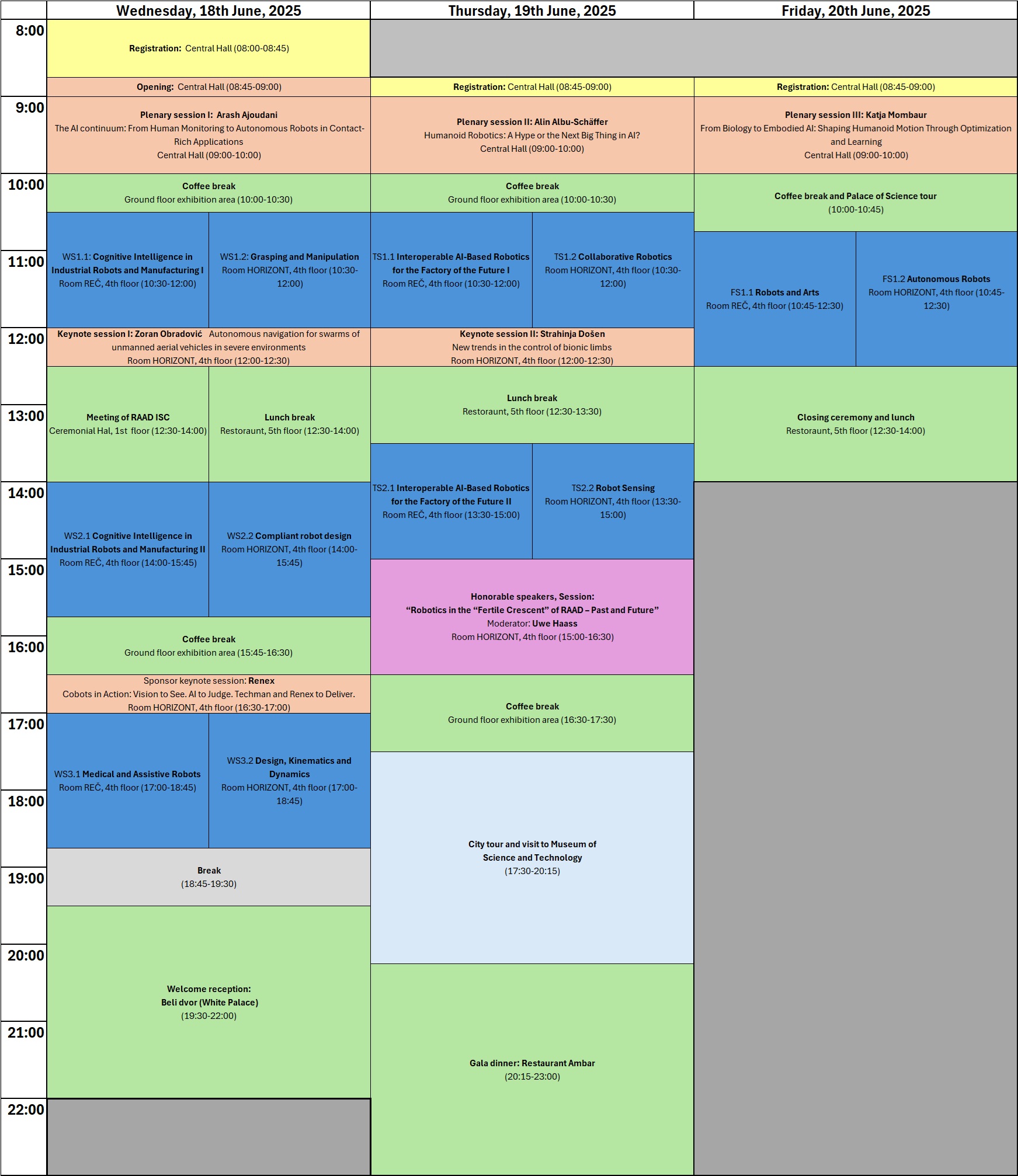34th International
Conference on Robotics
in Alpe-Adria-Danube Region
18 - 20 June, 2025
Belgrade, Serbia
Program
Complimentary family program
*Implementing the Complimentary Family Program depends on the number and structure of registered participants. The organizers reserve the right to cancel individual activities or modify the agenda.
For children aged 3–14 and parents, Language: English
Day 1 – June 18, 2025,
Morning (10:00–12:00): Palace of Science – Guided Tour
An interactive experience introducing children to the wonders of science, presented through engaging exhibits and live demonstrations.
Afternoon (14:00–16:00): Yandex Retro Gaming Museum
A nostalgic journey through retro video games, old computers, and tech history. Children and parents both love this unique and interactive museum.
Day 2 – June 19, 2025
Morning (10:00–12:00): LEGO Robotics Workshop, Dečiji Inovacioni Centar
Children will build and program their own robots using LEGO® Education kits, developing logical thinking, teamwork, and creativity.
The workshop is suitable for children aged 3–14 and will be tailored to age groups. Parents are welcome to join or can enjoy free time.
Afternoon (14:00–16:00): Visit to Museum of Illusions
A playful and thought-provoking experience for the whole family. Explore optical illusions, holograms, and interactive exhibits that challenge perception and inspire curiosity.
Plenary speakers
Alin Albu-Schäffer, Head of the Institute of Robotics and Mechatronics at the German Aerospace Center (DLR) and a professor at the Technical University of Munich.

Head of the Institute of Robotics and Mechatronics at the German Aerospace Center (DLR) and a professor at the Technical University of Munich.
Alin Albu-Schäffer received his M.S. in electrical engineering from the Technical University of Timisoara, Romania in 1993 and his Ph.D. in automatic control from the Technical University of Munich in 2002. Since 2012 he is the head of the Institute of Robotics and Mechatronics at the German Aerospace Center (DLR). Moreover, he is a professor at the Technical University of Munich, holding the Chair for "Sensor Based Robotic Systems and Intelligent Assistance Systems" at the School of Computation, Information and Technology. His personal research interests include robot design, modeling and control, nonlinear control, flexible joint and variable compliance robots, impedance and force control, physical human-robot interaction, bio-inspired robot design and control. He received several awards, including the IEEE King-Sun Fu Best Paper Award of the Transactions on Robotics in 2012 and 2014; several ICRA and IROS Best Paper Awards as well as the DLR Science Award. He was strongly involved in the development of the DLR light-weight robot and its commercialization through technology transfer to KUKA. He is the coordinator of euROBIN, the European network of excellence on intelligent robotics, IEEE Fellow and RAS-AdCom member.

Head of the Institute of Robotics and Mechatronics at the German Aerospace Center (DLR) and a professor at the Technical University of Munich.
Humanoid Robotics: A Hype or the Next Big Thing in AI?
Robots are not only machines which are supposed to relieve humans from dangerous or routine work – they are also a scientific endeavour attempting to better understand human and animal motion and intelligence in a synthetizing way, by using the system analytic tools of engineering and computer science.
As such, humanoid robots, be it on legs or on a wheeled mobile base, attracted a lot of attention and research effort in recent years. From mechatronics and control standpoint, humanoids became a quite mature technology during the last years, and still, the development in this field continues at a high pace of innovation. The convergence of these developments with rapidly evolving artificial intelligence techniques has created the foundation for a new generation of cognitive, adaptive, multi-purpose machines - commonly referred to as Physical AI or Embodied Intelligence, or AI-Powered Robotics. The exploding commercial interest in humanoids in the last two years underlines the huge potential of this technology.
Arash Ajoudani, Italian Institute of Technology, Genoa, Italy.
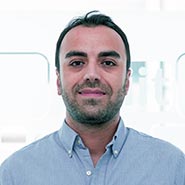
Arash Ajoudani
Italian Institute of Technology, Genoa, Italy
Arash Ajoudani is the director of the Human-Robot Interfaces and Interaction (HRI²) laboratory at IIT. He is a recipient of the European Research Council (ERC) proof-of-concept grant 2023 Real-Move and the ERC starting grant 2019 (Ergo-Lean), the coordinator of the Horizon-2020 project SOPHIA, the co-coordinator of the Horizon-2020 project CONCERT, and a principal investigator of the HORIZON-MSCA project RAICAM, and the national projects LABORIUS, COROMAN, and ReFinger. He is a recipient of the IEEE Robotics and Automation Society (RAS) Early Career Award 2021, and winner of the SmartCup Liguria award 2023, Amazon Research Awards 2019, of the Solution Award 2019 (MECSPE2019), of the KUKA Innovation Award 2018, of the WeRob best poster award 2018, and of the best student paper award at ROBIO 2013. His PhD thesis was a finalist for the Georges Giralt PhD award 2015 - best European PhD thesis in robotics. He was also a finalist for the best paper award on human-robot interaction at ICRA2024, the best paper award mobile manipulation at IROS 2022, the best paper award at Humanoids 2022 (oral category), the Solution Award 2020 (MECSPE2020), the best conference paper award at Humanoids 2018, the best interactive paper award at Humanoids 2016, the best oral presentation award at Automatica (SIDRA) 2014, and for the best manipulation paper award at ICRA 2012.
He is the author of the book "Transferring Human Impedance Regulation Skills to Robots" in the Springer Tracts in Advanced Robotics (STAR), and several publications in journals, international conferences, and book chapters. He is currently serving as an elected IEEE RAS AdCom member (2022-2024), and as chair and representative of the IEEE-RAS Young Professionals Committee, and as a Senior Editor of the International Journal of Robotics Research (IJRR). He has been serving as a member of scientific advisory committee and as an associate editor for several international journals and conferences such as IEEE RAL, ICRA, IROS, ICORR, etc. He is a scholar of the European Lab for Learning and Intelligent Systems (ELLIS). His main research interests are in physical human-robot interaction, mobile manipulation, robust and adaptive control, assistive robotics, and tele-robotics.

Arash Ajoudani
Italian Institute of Technology, Genoa, Italy
The AI continuum: From Human Monitoring to Autonomous Robots in Contact-Rich Applications
This talk explores the evolving landscape of applied machine learning across the continuum of human-robot interaction, with a focus on contact-rich environments. Starting from human monitoring for cognitive and physical states, the presentation will highlight how adaptive AI systems can personalize robot behavior to individual needs, enhance safety, and improve collaboration. It will then transition to fully autonomous robotic systems capable of handling complex manipulation tasks in unstructured settings. Through insights from recent research in human-in-the-loop learning, adaptive control, and foundational models, the talk will outline the path toward resilient, intelligent, and context-aware robots that can seamlessly integrate into both industrial and assistive scenarios.
Katja Mombaur, Karlsruhe Institute of Technology, Germany, and University of Waterloo, Canada.
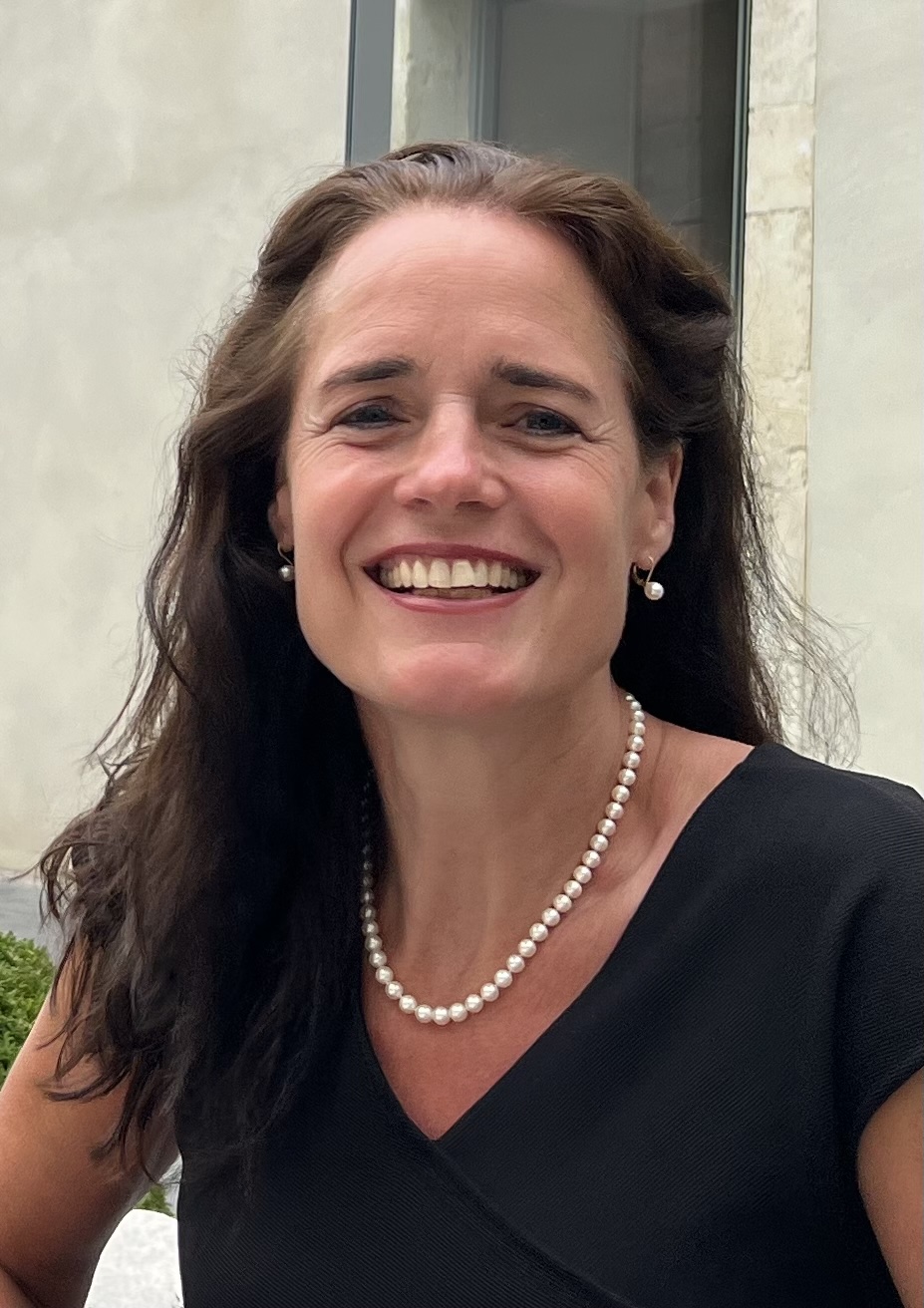
Katja Mombaur, Karlsruhe Institute of Technology, Germany, and University of Waterloo, Canada
Katja Mombaur joined the Karlsruhe Institute of Technology in Germany in 2023 as Full Professor, Chair for Optimization & Biomechanics for Human-Centred Robotics and Director of the BioRobotics Lab. In addition, she holds an affiliation with the University Waterloo in Canada where she has been Full Professor and Canada Excellence Research Chair (CERC) for Human-Centred Robotics & Machine Intelligence since 2020. Prior to moving to Canada, she has been a Full Professor at Heidelberg University where she directed the Optimization, Robotics & Biomechanics Chair, as well as the Heidelberg Center for Motion Research. Her international experience includes research activities at LAAS-CNRS in Toulouse and Seoul National University, as well as in the USA. She studied Aerospace Engineering at the University of Stuttgart and SupAéro and holds a PhD in Mathematics from Heidelberg University.
Katja Mombaur currently serves as the Vice President for Member Activities of the IEEE Robotics & Automation Society and as Senior Editor of the IEEE Transactions on Robotics .
Katja’s research focuses on understanding human movement by a combined approach of model-based optimization and experiments and using this knowledge to improve motions of humanoid robots and the interactions of humans with exoskeletons, prostheses, and external physical devices. Her goal is to endow humanoid and wearable robots with motion intelligence that allows them to operate safely in a complex human world. The development of efficient algorithms for motion generation, control, and learning is a core component of her research.

Katja Mombaur, Karlsruhe Institute of Technology, Germany, and University of Waterloo, Canada
From Biology to Embodied AI: Shaping Humanoid Motion Through Optimization and Learning
Humanoid robotics has advanced rapidly, with new prototypes emerging from both industry and academia. These robots are increasingly capable and bring us closer to the vision of machines assisting humans in dirty, dull, or dangerous tasks—and even serving as companions or caregivers. However, achieving human-level motor skills in humanoids remains challenging due to their complex dynamics, high degrees of freedom, underactuation, and instability.
In this talk, I will present our research on endowing humanoid robots with embodied artificial intelligence—the ability to understand and adapt their motion in dynamic environments with physical and social interactions. Our goal is to uncover fundamental principles of human movement, such as stability, efficiency, and behavioral optimality, and translate these into computational models. These models not only provide bioinspiration for robot motion but also help infer human intent during interaction.
We combine model-based methods, like optimization and learning in simulation with model-free approaches to develop motion strategies that are both efficient and adaptable. I will showcase a range of results, including locomotion over uneven terrain, dynamic balancing, bimanual manipulation, and close human-robot interaction in contexts such as dancing or medical assistance. These examples illustrate how integrating principles from biology and computation leads to more intelligent, responsive humanoid behavior.
Keynote speakers
Zoran Obradovic, Temple University, USA

Zoran Obradovic, Laura H. Carnell Professor of Data Analytics
Data Analytics and Biomedical Informatics Center,
Computer and Information Sciences Department,
Statistics Department
Temple University
Zoran Obradovic is a Distinguished Professor and Center Director at Temple University, an Academician at the Academia Europaea (the Academy of Europe), and a Foreign Academician at the Serbian Academy of Sciences and Arts. He has mentored approximately 50 postdoctoral fellows and Ph.D. students, many of whom have established independent research careers at academic institutions (e.g., Northeastern University, Ohio State University) and industrial research labs (e.g., Amazon, eBay, Facebook, Hitachi Big Data, IBM T.J. Watson, Microsoft, Yahoo Labs, Uber, Verizon Big Data, Spotify). Zoran serves as the editor-in-chief of the Big Data journal and is the steering committee chair for the SIAM Data Mining conference. He is also a member of the editorial boards for 13 journals and has held roles as general chair, program chair, or track chair for 11 international conferences. His research interests encompass data science and complex networks in decision support systems, addressing challenges related to big, heterogeneous, spatial, and temporal data analytics, motivated by applications in healthcare management, power systems, and earth and social sciences. His studies have received funding from AFRL, DARPA, DOE, NIH, NSF, ONR, the PA Department of Health, US Army ERDC, US Army Research Labs, and various industry sources. He has published around 450 articles and has been cited approximately 35,000 times (H-index 69). For more details, see http://www.dabi.temple.edu/zoran-obradovic.

Zoran Obradovic, Laura H. Carnell Professor of Data Analytics
Data Analytics and Biomedical Informatics Center,
Computer and Information Sciences Department,
Statistics Department
Temple University
Autonomous navigation for swarms of unmanned aerial vehicles in severe environments
This presentation will discuss our constrained machine learning based approach for swarm of unmanned aerial vehicles (UAVs) path planning and obstacle avoidance. Using 3D LiDAR and intra swarm communication, this model allows zero-shot learning which optimizes swarm of UAVs flying time without extensive training. A comparative analysis highlights the model’s advantages for path optimization, collision avoidance, and time efficiency in severe environments. In addition, to facilitate navigation where GPS signal is disrupted, our reliable and cost-effective method will be described to infer the positions of drones based on information extracted from aerial images taken during flight using the drones’ onboard cameras.
Strahinja Dosen, Aalborg University, Denmark

Strahinja Dosen
Aalborg University, Denmark
Strahinja Dosen received the Diploma of Engineering in Electrical Engineering and the M.Sc. degree in Biomedical Engineering in 2000 and 2004, respectively, from the Faculty of Technical Sciences, University of Novi Sad, Serbia, and the Ph.D. degree in Biomedical Engineering from the Center for Sensory-Motor Interaction, Aalborg University, Denmark, in 2009. From 2011 to 2017, he worked as a Research Scientist at the Institute for Neurorehabilitation Systems, University Medical Center Gottingen, Germany, and then as an Associate Professor at the Department of Health Science and Technology (HST), Aalborg University (AAU). Currently, he is a Full Professor in the same Department and leads a research group on Neurorehabilitation Systems. Prof. Dosen was a principal investigator for AAU and HST in several EU (Tactility, Wearplex, Sixthsense, and SimBionics) and nationally (Robin, Remap, and Climb) funded projects. He published more than 120 manuscripts in peer-reviewed journals, and his main research interest is the closed-loop control of assistive robotic systems.

Strahinja Dosen
Aalborg University, Denmark
New trends in the control of bionic limbs
The lecture will start by introducing the conventional state-of-the-art methods for the control of robotic prostheses based on the processing of myoelectric signals, including the use of machine learning (pattern recognition and regression). We will then address the drawbacks of these methods and related challenges for clinical translation and wider use. An alternative approach to controlling bionic limbs will be presented, where the main idea is to enhance these systems with additional sensors and cognitive-like processing so that they can perform some functions autonomously (semi-automatic control). Semi-autonomous prosthesis prototypes will be described, and it will be shown how they can improve prosthesis performance while decreasing the cognitive and physical effort of control. Finally, we will introduce the new generation of bionic limbs that are enhanced with connectivity, allowing them to access the virtually unlimited computational resources of the Cloud and Edge. The radically new functions enabled by the Cloud/Edge computing will be discussed, including computational offloading, continuous data logging, adaptation, and learning, as well as remote intervention. The lecture will end by summarizing the pros and cons of the three approaches to prosthesis control (namely, conventional, semi-autonomous, and connected bionics) and discussing the perspectives for the future of bionic limbs.
Robotics in the “Fertile Crescent” of RAAD – Past and Future
Branislav Borovac, University of Novi Sad
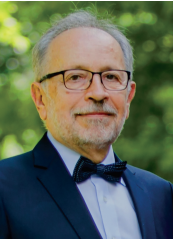
Branislav Borovac,
Professor Emeritus,
University of Novi Sad,
Serbia
borovac@uns.ac.rs
Branislav Borovac received the M.Sc. and Ph.D. degrees in Mechanical Engineering from the Faculty of Technical Sciences, University of Novi Sad in 1982 and 1986 respectively. In both theses supervisor was Professor Miomir Vukobratović. He became Assistant Professor of Engineering Design in 1987, Assistant Professor of Robotics in 1988, Associate Professor of Robotics in 1993 and since 1998 he has been Professor of Robotics. He retired in 2020, and in 2022 he was elected professor emeritus, all at the Faculty of Technical Sciences, University of Novi Sad. From the beginning his research was closely tied to Professor Vukobratović and (besides “fundamental general robotics”) concerned with humanoids, particularly, biped locomotion. On the basis of this collaboration were published research monographs, book chapters, papers in international journals, as well as presented papers at international conferences and congresses. According to Google scholar his citation index is over 6000. He was visiting professor at Versailles Engineering System Laboratory - LISV, University of Versailles Saint-Quentin-en-Yvelines, Versailles in 2009 and Prince of Songkla University, Hat Yai, Thailand, in 2012, 2013, 2014, 2015. 2017. and 2018. He is Associate editor of International Journal of Humanoid Robotics. His research interest includes robot modeling and control, industrial robotics, sensors and sensor information integration, humanoids, biped locomotion, mechatronics.

Branislav Borovac,
Professor Emeritus,
University of Novi Sad,
Serbia
borovac@uns.ac.rs
Professor Vukobratović - personality and work that inspire
Prof. Vukobratović initiated research not only in this region, but it is safe to say all over the world. We will also mention his work that preceded robotics, but in the presentation we will try to shed light on his character and work as a pioneer of robotics who left his mark in many areas of robotics, such as: ZMP concept and semi-inverse method, active rehabilitation exoskeletons, recursive formulation of robot dynamics, robot dynamic control, centralized and decentralized control, force feedback in dynamic control of robots, robot interacting with dynamic environment, control of multi-arm cooperating robots, application of connectionist algorithms for advanced learning control of robot interacting with dynamic environment, fuzzy logic robot control with model-based dynamic compensation, integrated dynamic control of robotized road vehicles.
In this presentation, I will try to show that the appearance of the first fundamental results of the Belgrade School of Robotics has, to a great extent, coincided with the foundation of robotics as a scientific discipline in the field of technical sciences.
Before reviewing our most important contributions in the domain of robotics I would like to emphasize that this presentation is an homage to professor Vukobratović work, within which I have acted in the course of thirty five years, practically the whole my working life. It appeared that the milestones in this development represent at the same time the fundamental results of robotics in general.
We will also refer to his relationship with his collaborators, which is an example of extraordinary cooperation.
Giuseppe Carbone, University of Calabria
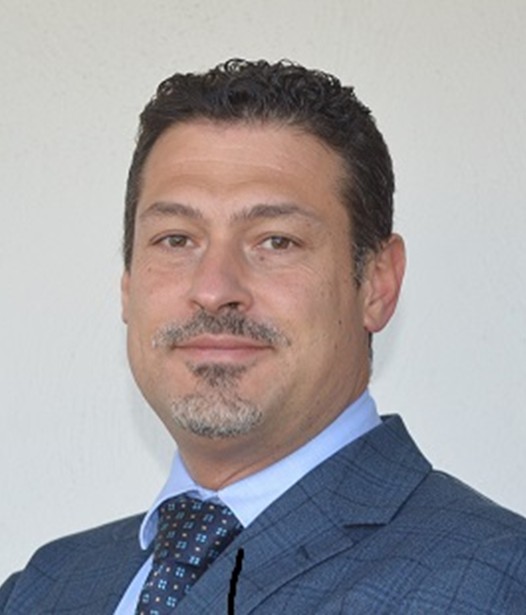
Giuseppe Carbone,
Professor,
University of Calabria,
giuseppe.carbone@unical.it
Giuseppe Carbone is with University of Calabria, Italy, since 2018. He currently chairs the IFToMM TC on Robotics and Mechatronics, and he is elected Vice-President of the Italian Institute of Robotics and Intelligent Machines (I-RIM), which represents most of robotics-related disciplines and academic institutions across Italy.
He is scientific director of the laboratory of innovative biomedical robotics. His research interests include Manipulation and Grasp, Assistive Robotics, Mechatronics. His work has led to over 500 research publications, 20 patents, 16 PhD completions (12 ongoing) and impactful teaching and research periods across Germany, Japan, Spain, UK, and other nations.
Carbone serves in the editorial boards of several reputed journals such as IEEE RA-L, IEEE/ASME Transaction on Mechatronics, Journal of Bionic Engineering, as well as he serves as Editor-in-Chief for ROBOTICA (Cambridge University Press). He has received numerous awards, including two Honoris Causa Doctoral Degrees.

Giuseppe Carbone,
Professor,
University of Calabria,
giuseppe.carbone@unical.it
Italian Distinguished IFToMMist Figures in Mechanism and Machine Science and Their Links with RAAD
This presentation examines the contributions of Italian pioneers in the field of Mechanism and Machine Science within the framework of IFToMM (International Federation for the Promotion of Mechanism and Machine Science).
Special emphasis is placed on their connections with the RAAD (International Conference on Robotics in Alpe Adria-Danube Region), highlighting the pivotal role these individuals have played in shaping the RAAD scientific community, fostering its collaborative spirit, and building its enduring legacy over the years.
Jadran Lenarčič, Institut Jožef Stefan, Ljubljana
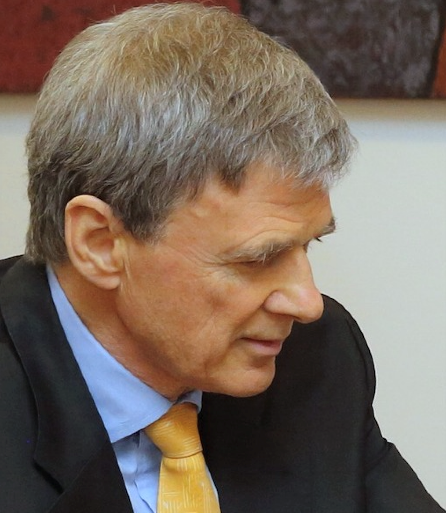
Jadran Lenarčič,
Professor Emeritus,
Institut Jožef Stefan,
Ljubljana
lenarcic@ijs.si
Prof. Lenarčič is one of the pioneers of robotics in the country. He was employed at the Institute Jožef Stefan. He was also its director for fifteen years. He has been involved in various national and international boards, committees, and advisory bodies. He is a robotics lecturer at the Faculty of Electrical Engineering of Ljubljana.
His basic research interests are in robotics, robot kinematics, and humanoid robotics. His contributions are in the modelling and simulation of robots, evaluation and optimization of robot mechanisms, modelling of human upper extremities and control of redundancy.
Prof. Lenarčič is a recipient of the National Medal of Work with Silver Wreath, the Italian Cavaliere nell’Ordine al Merito della Repubblica Italiana and the French Chevalier de l’Ordre National du Mérit. Lenarčič is a Full Member of the Slovenian Academy of Engineering and served as President. He is a Corresponding Member of the Accademia Delle Scienze di Bologna, Italy.

Jadran Lenarčič,
Professor Emeritus,
Institut Jožef Stefan,
Ljubljana
lenarcic@ijs.si
Institute Jožef Stefan – Between Research, Development and use of Robots
Slovenia is one of the countries with the highest density of robots per employee globally. This is certainly the result of the fairly early start of robotics development in Slovenia, which dates back to the late 1970s and especially to the early 1980s. The main industrial carriers were initially successful export companies such as Gorenje and Iskra, and a little later also Riko. All three also intended to become manufacturers of robotic technology. Specialized robot integrators also appeared. Scientific research in Slovenia was also well coordinated between the University of Ljubljana, the University of Maribor and the Institute Jožef Stefan. The majority of research at the IJS was focused on robot kinematics and dynamics, dynamic control, modern programming languages and computer vision, and research of human motion with an emphasis on the shoulder. The ARK conference, which IJS has led from 1988 to the present, is also recognized worldwide.
Imre Rudas and Péter Galambos, Obuda University, Budapest

Imre Rudas,
Professor Emeritus,
Obuda University,
Budapest,
rudas@uni-obuda.hu
Imre J. Rudas graduated in Budapest in 1971 in Mechanical Engineering, received the Master Degree in Mathematics from the Eötvös Loránd University, Budapest, the Ph.D. in Robotics from the Hungarian Academy of Sciences in 1987, while the Doctor of Science degree from the Hungarian Academy of Sciences in 2004. He is Rudolf Kalman Distinguished Professor, Rector Emeritus and Professor Emeritus of Óbuda University. He is a Life Fellow of IEEE and the Senior Past President of IEEE Systems, Man, and Cybernetics Society. He is a Fellow of International Fuzzy systems Association. He has been involved in RAAD since the mid-90s and was the General Chair of RAAD 2002, 2006 and 2010. His present areas of research activities are Computational Cybernetics, Robotics. He has edited and/or published 22 books, published more than 910 papers in international scientific journal, conference proceedings and book chapters, and received more than 9200 citations.

Péter Galambos,
Professor and Director of the
Antal Bejczy Center for
Intelligent Robotics,
Obuda University,
Budapest,
galambos.peter@uni-obuda.hu
Peter Galambos (Senior Member, IEEE) received his M.Sc. and Ph.D. degrees in mechanical engineering from the Budapest University of Technology and Economics (BME) in 2006 and 2013, respectively. From 2007 to 2008, he was a Research Intern at the Toshiba Corporate Research and Development Center. He then joined the Institute for Computer Science and Control of the Hungarian Academy of Sciences (MTA SZTAKI), where he held a Young Researcher Scholarship from 2010 to 2012. Between 2011 and the end of 2015, he served as a team leader at MTA SZTAKI, coordinating the development of the VirCA VR system and its research applications. In 2013, he joined Obuda University, where he has been actively involved in robotics-related research, development, and education. He is currently a Full Professor and Director of the Antal Bejczy Center for Intelligent Robotics at Obuda University, Budapest. Since July 2024, he has been serving as Vice-Rector for Innovation. His current research interests include Advanced Industrial Robotics and Control Systems, Cyber-Physical Systems, and Virtual Reality. He is the author or co-author of over 160 scientific publications, with more than 2,100 citations. Beyond his academic career, he is a successful entrepreneur, co-founder, and CTO of the MAXWHERE 3D Digital Twin software platform.
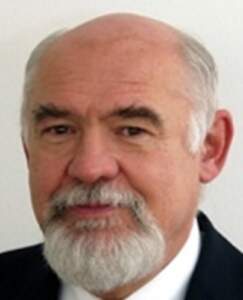
Imre Rudas,
Professor Emeritus,
Obuda University,
Budapest,
rudas@uni-obuda.hu
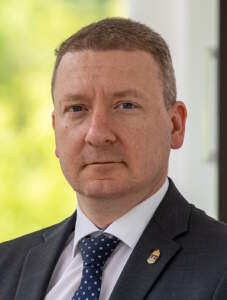
Péter Galambos,
Professor and Director of the Antal Bejczy Center for Intelligent Robotics,
Obuda University,
Budapest,
galambos.peter@uni-obuda.hu
A Brief History of Robotics Development Efforts in Hungary
In Hungary the first efforts in robotics development started in the early 70s. The presentation starts with the brief summary of the institutions, companies those were involved in robotics in the early stages and their achievements.
The more organized robotic community was born in the mid-80s with establishment of Hungarian Robotics Association. The Association started to launch international relations; with International Federation of Robotics and especially with the surrounding countries.
Hungarian researchers (partly with government support) started to attend regional Robotics Workshops and Conferences, for example JUROB, RAAD, and other robotics events organized by the Technical University of Vienna and Mihajlo Pupin Institute. Hungarian representatives joined to the RAAD community in the mid-90s and organized RAAD 1996, 2002, 2006, 2010 in Hungary. The presentation will contain the personal involvement of the author in these events and his memories about the distinguished pioneers of robotics in our region and RAAD founders.
Session Moderator: Dr Uwe Haass, Roboconsult, Germany.
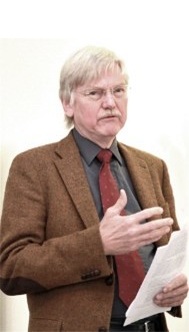
Dr. Uwe Haass
Breisacher Str. 2, 81667 München,
Germany,
Uwe.Haass@roboconsult.eu
Uwe Haass studied Electrical Engineering in Karlsruhe and received his PhD in the US in 1980 for his work on tracking clouds in satellite pictures. After returning to Germany, he continued research in Computer Vision for robotics at the IITB Fraunhofer Institute. Several positions of research management followed, in 1985 at the EU Commission in Brussels as Project Officer with the ESPRIT programme, in 1990 General Manager of the first Bavarian Research Institute on AI, and in 2007 General Manager of the Center of Excellence for cognitive robotics in Munich. In the wake of the robotics initiative of the EU Commission, he became the first Secretary General of the European Robotics Association euRobotics in Brussels. Since his retirement in 2016, he is working as a freelancing consultant in aspects of innovation management and regional development with robotics.




